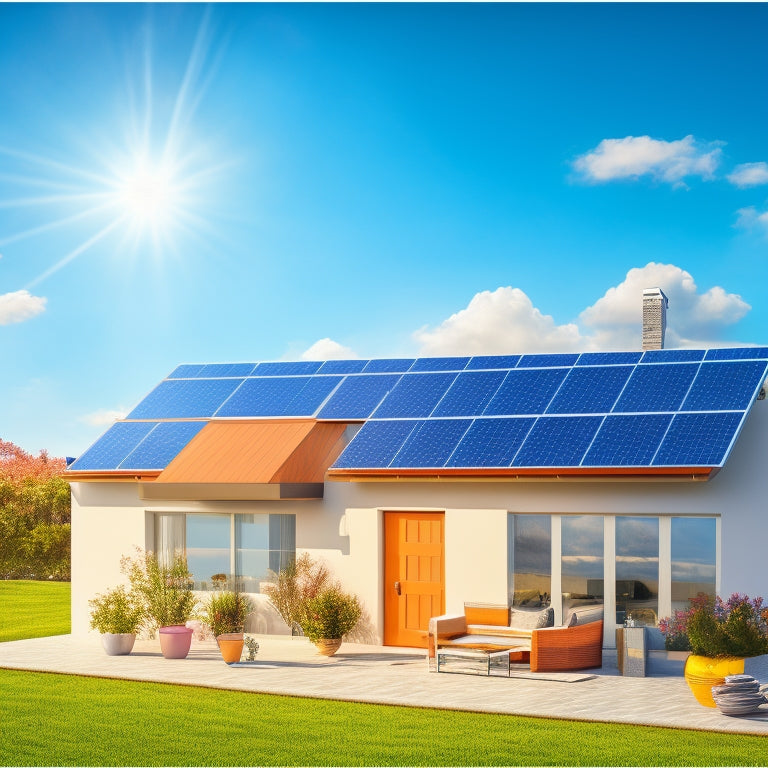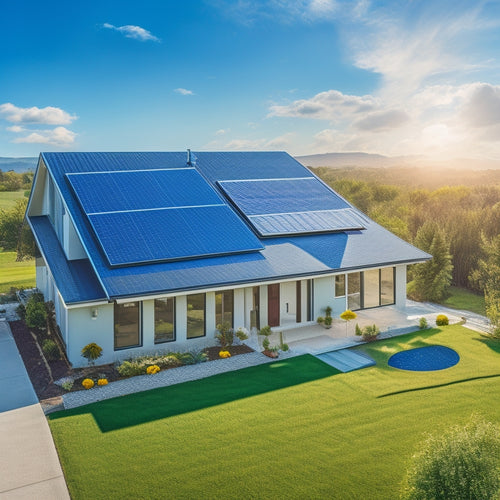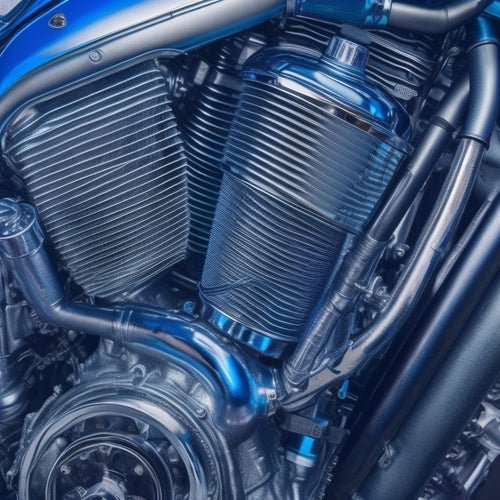
What Are the Best Online Deals for Home Panels?
Share
When shopping for home solar panels online, you'll find top brands like SunPower, Panasonic, and LG offering high-efficiency products with extensive warranties. You can compare pricing, warranty, and customer service for online solar panel stores like Amazon, Home Depot, and Lowe's. Specialty stores like SolarCity and Sunrun offer customized solutions, while online marketplaces provide discounts and promotions. With federal incentives and cost-effective installation methods, you can greatly reduce upfront costs. As you explore online deals, consider factors like warranty length, efficiency ratings, and customer reviews to find the best option for your home - and discover even more ways to save.
Key Takeaways
• Compare pricing, warranty, and customer service for online solar panel stores like Amazon, Home Depot, and Lowe's for the best deals.
• Explore online marketplaces and wholesale suppliers for affordable high-quality panels at discounted rates.
• Evaluate factors like warranty length, efficiency ratings, and customer reviews for reputable brands like SunPower, Panasonic, and Tesla.
• Take advantage of online promotions, discounts, and green financing options like low-interest loans or power purchase agreements to reduce upfront costs.
• Consider specialty stores like SolarCity and Sunrun that offer customized solutions and potentially better deals for home panels.
Top Brands for Home Solar
You have numerous top brands to choose from when it comes to home solar panels, each offering unique features, benefits, and price points. When selecting the best brand for your home, it's important to take into account factors such as Solar Certifications, warranty, and customer service.
Look for brands with certifications from reputable organizations like UL (Underwriters Laboratories) and IEC (International Electrotechnical Commission), ensuring your panels meet international standards. Brand Loyalty also plays an important role, as established brands often provide better customer support and longer warranties.
Some top brands, like SunPower and Panasonic, offer premium products with high-efficiency ratings and extensive warranties. Others, like Tesla and LG, provide innovative solutions with sleek designs and competitive pricing.
Research each brand's strengths and weaknesses to find the best fit for your budget and energy needs. By weighing your options carefully, you'll be well on your way to harnessing the power of the sun.
Best Online Solar Panel Stores
With over a dozen online stores offering solar panels, it's easier than ever to find the perfect fit for your home energy needs. You can now compare prices, read Solar Reviews, and make informed decisions from the comfort of your own home.
When it comes to Store Comparisons, you'll want to take into account factors like pricing, warranty, and customer service.
Some popular online stores for solar panels include Amazon, Home Depot, and Lowe's. These retailers offer a wide range of solar panels from top brands, often with free shipping and competitive pricing. You can also check out specialty online stores like SolarCity and Sunrun, which offer customized solar panel systems and installation services.
When shopping online, be sure to read reviews from other customers to get a sense of the store's reputation and customer service. You should also look for certifications like UL (Underwriters Laboratories) and IEC (International Electrotechnical Commission) to make sure the panels meet safety and performance standards.
Discounted Residential Solar Systems
Shopping online for solar panels can also help you snag discounted residential solar systems, which can greatly reduce the upfront cost of going solar. By taking advantage of online deals, you can save thousands of dollars on your solar panel installation. Additionally, you may be eligible for Federal incentives, such as the Solar Investment Tax Credit (ITC), which can further reduce your costs.
When shopping online, be sure to consider the following factors to get the best deal:
| Factor | Description | Impact on Cost |
|---|---|---|
| System Size | Larger systems produce more energy, but cost more | Increases cost |
| Panel Efficiency | Higher efficiency panels produce more energy per hour | Increases cost |
| Installation Company | Reputable companies may charge more for their services | Increases cost |
| Local Permits | Fees for permits and inspections can vary by location | Increases cost |
| Federal Incentives | Tax credits and rebates can reduce your upfront cost | Decreases cost |
Cheap Solar Panels for Homes
Affordable solar panels for homes can be sourced from online marketplaces and wholesale suppliers, offering cost-effective options for homeowners looking to reduce their energy costs. You can find high-quality solar panels at discounted rates, making it a feasible choice for those on a budget. When shopping online, you'll come across various sellers offering competitive prices, allowing you to compare and choose the best deal.
Moreover, you can capitalize on Solar Savings by investing in inexpensive solar panels. Not only will you reduce your energy bills, but you'll also contribute to a cleaner environment. Additionally, you may be eligible for Green Incentives, such as tax credits or rebates, which can further offset the initial cost of installation.
Online Deals for Solar Energy
You can score even better deals on solar energy systems by exploring online marketplaces and websites that aggregate discounts and promotions from various suppliers. These websites often feature solar incentives, such as rebates, tax credits, and low-interest loans, which can greatly reduce the upfront cost of going solar. By taking advantage of these incentives, you can enjoy greater energy efficiency and savings on your electricity bills.
When shopping online, look for websites that offer price comparisons, customer reviews, and ratings to help you make an informed decision. Some popular online marketplaces for solar energy systems include EnergySage, SolarReviews, and Google's Project Sunroof. These platforms connect you with multiple suppliers, allowing you to compare prices and find the best deal for your needs.
Buy Solar Panels Wholesale
When you're looking to buy solar panels wholesale, you're likely looking for the best deal possible.
You can greatly reduce your upfront costs by taking advantage of wholesale solar panel prices, which can be up to 30% lower than retail prices.
Wholesale Solar Panel Prices
Purchasing solar panels in bulk can greatly lower your upfront costs, making it a compelling choice for homeowners and businesses looking to switch to renewable energy.
By buying in bulk, you can take advantage of wholesale solar panel prices, which can be notably lower than purchasing individual panels.
Additionally, you may be eligible for solar incentives, such as tax credits or rebates, which can further decrease your costs.
When shopping for wholesale solar panels, prioritizing price transparency is crucial.
Look for suppliers that provide clear and detailed pricing information, including the cost per watt and any additional fees.
This will help you make an informed decision and avoid any unexpected costs.
As you explore wholesale solar panel options, be sure to research the quality and durability of the panels, as well as the warranty and customer support offered by the supplier.
Bulk Purchase Discounts
Buying in bulk can slash your solar panel costs by up to 30%, making it a highly attractive option for those looking to harness renewable energy. By leveraging economies of scale, you can greatly reduce your upfront investment and enjoy greater savings over the long term.
When you buy in bulk, you're taking advantage of the supplier's reduced costs per unit, which are then passed on to you. This means you can enjoy higher quality panels at a lower cost per watt.
As a bulk buyer, you're also exercising buying power, giving you greater negotiating leverage with suppliers. This can lead to additional discounts, priority shipping, and even dedicated customer support.
With bulk purchasing, you're not limited to small, piecemeal orders. Instead, you can invest in a wide-ranging solar panel system that meets your energy needs. By doing so, you'll not only save money but also reduce your carbon footprint and gain energy independence.
Residential Solar Panel Prices
You can expect to pay between $2.50 and $3.50 per watt for residential solar panels, with the total cost of a system varying widely depending on factors like your location, roof size, and local incentives.
The overall cost of a solar panel system can range from $15,000 to $30,000 or more, depending on the size of the system and the quality of the equipment. However, with solar incentives like the federal solar investment tax credit (ITC), you can deduct 26% of the total cost from your taxes. Additionally, many states and utilities offer rebates and credits that can further reduce the upfront cost.
Energy efficiency is also a key consideration, as high-efficiency panels can generate more power per hour of sunlight, making them a worthwhile investment for homeowners who want to maximize their energy production.
Top Rated Solar Panel Brands
When selecting a solar panel system, choosing a reputable brand is essential, as it directly impacts the performance, durability, and overall value of your investment. You want a brand that's reliable, efficient, and provides high-quality. So, which brands stand out from the rest?
Look for brands with a strong brand reputation, built on years of experience, innovative technology, and customer satisfaction. Top-rated brands like Panasonic, LG, and SunPower offer high-efficiency solar panels with exceptional durability. Their products are designed to withstand harsh weather conditions, ensuring excellent performance and longevity.
Other notable brands, such as Trina, Jinko, and Canadian Solar, also offer high-quality solar panels with impressive warranties and reliable performance.
When evaluating brands, consider factors like warranty length, efficiency ratings, and customer reviews. By choosing a reputable brand, you can secure a high-performing solar panel system that meets your energy needs and provides a strong return on investment.
With the right brand, you'll enjoy years of clean energy and savings on your utility bills.
Solar Panel Kits for Homeowners
When shopping for a solar panel kit as a homeowner, you'll want to take into account a few key factors to make sure you're getting the best deal.
You'll need to prioritize panel quality, as high-efficiency panels can make a big difference in your energy output.
Panel Quality Matters
High-quality solar panels are essential for homeowners, as they directly impact the system's overall efficiency, durability, and return on investment. You want panels that can withstand harsh weather conditions and last for decades, providing a reliable source of clean energy.
Panel durability is vital, as it affects the system's performance and longevity. Look for panels with a durable frame, tempered glass, and a waterproof design to guarantee they can withstand extreme weather conditions.
Energy efficiency is another critical factor to take into account. You want panels with high energy efficiency ratings to maximize your energy output. This is especially important if you have limited roof space, as high-efficiency panels can generate more power per hour of sunlight.
When shopping for solar panels, look for products with high energy efficiency ratings, usually above 20%. This will ensure you get the most out of your solar panel system and reap the benefits of clean, renewable energy.
Cost-Effective Installation
You can greatly decrease the upfront cost of going solar by choosing a cost-effective installation method, such as purchasing a solar panel kit specifically designed for homeowners. These kits typically include everything you need to get started, from the panels themselves to the mounting hardware and inverters.
By opting for a DIY installation, you can reduce labor costs by up to half of the total installation cost. However, it's important to take into account the site preparation, roof assessments, and permit fees that may still apply. Be sure to research and factor in these costs when planning your installation.
When choosing a kit, look for providers that offer warranty options, quality control measures, and safety protocols to ensure a smooth and safe installation process. With careful planning and execution, you can enjoy significant savings on your energy bills and a reduced carbon footprint.
Energy Output Boost
By incorporating a solar panel kit specifically designed for homeowners, you can greatly enhance your energy output and maximize your return on investment. These kits often include advanced technologies that optimize energy production, such as Solar Inverters, which convert DC power into usable AC power for your home.
Here are four ways to boost your energy output:
-
Power Optimization: Guarantee maximum energy production by optimizing your solar panel's performance. This is achieved through advanced monitoring and tracking systems that identify and address any issues.
-
High-Efficiency Panels: Upgrade to high-efficiency solar panels that convert more sunlight into electricity, resulting in increased energy output.
-
Smart Solar Inverters: Utilize advanced Solar Inverters that optimize energy production and provide real-time monitoring and alerts for any performance issues.
- Energy Storage Solutions: Combine your solar panel kit with energy storage solutions, such as batteries, to store excess energy generated during the day for use during the night or on cloudy days.
Affordable Solar Panel Options
Several affordable solar panel options are now available on the market, offering homeowners a range of choices to suit their budget and energy needs. If you're considering switching to solar power, you'll be glad to know that the cost of solar panels has decreased considerably over the years, making it more accessible to homeowners like you.
One of the most attractive aspects of affordable solar panel options is the availability of solar incentives. These incentives can help reduce the upfront cost of installing solar panels, making it more affordable for you.
Additionally, green financing options are becoming increasingly popular, allowing you to finance your solar panel installation with low-interest loans or power purchase agreements. This means you can start saving on your energy bills right away, without having to pay the full cost of the installation upfront.
With affordable solar panel options, you can start harnessing the power of the sun to reduce your energy costs and carbon footprint.
Frequently Asked Questions
Can I Install Solar Panels on a Rented Property?
As you gaze upon the medieval castle, you ponder, "Can I install solar panels on a rented property?" Well, you'll need to get your landlord's approval, ensuring it's written into your rental contracts and agreements, to harness the sun's power.
Do Solar Panels Work During a Power Outage?
You're wondering if solar panels work during a power outage. Unfortunately, they don't, unless you have a battery backup system, which provides emergency power during outages, allowing you to stay connected.
Are There Solar Panels Specifically Designed for Small Homes?
You might think small homes can't accommodate solar panels, but compact systems are specifically designed for limited roof space, prioritizing energy efficiency to maximize power output, making them a perfect fit for your cozy abode.
Can I Sell Excess Energy Back to the Grid?
You can sell excess energy back to the grid through energy trading, earning grid revenue. This process, known as net metering, allows you to offset your energy costs and even generate income.
Do Solar Panels Require Regular Maintenance?
You'll be relieved to know that solar panels are relatively low-maintenance, with a typical panels' lifespan of 25-30 years. A simple cleaning schedule, ideally every 6-12 months, is all you need to guarantee peak energy production.
Related Posts
-

Electrify Your Short Trips With These 10 Tips
You're about to take your daily short trips to the next level! Whether you're looking to zoom past traffic jams, redu...
-

5 Best Steps to Installing Solar Panels at Home
You're about to start on a journey to harness the power of solar energy at home. First, assess your home's solar pote...
-

Boosting Motorcycle Performance With High-Torque Upgrades
You're seeking to maximize your motorcycle's full potential with high-torque upgrades. By swapping to a high-torque m...


